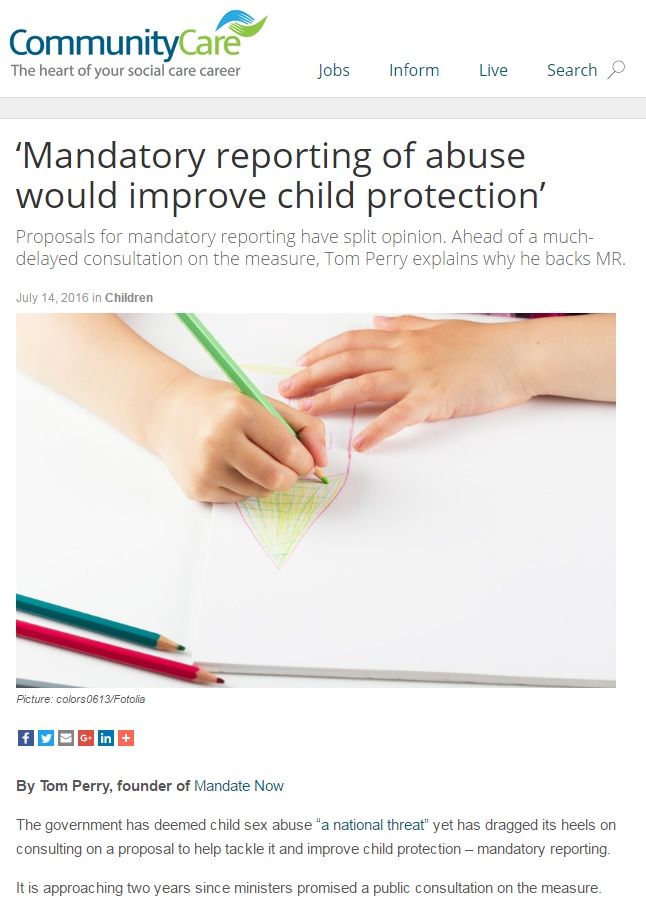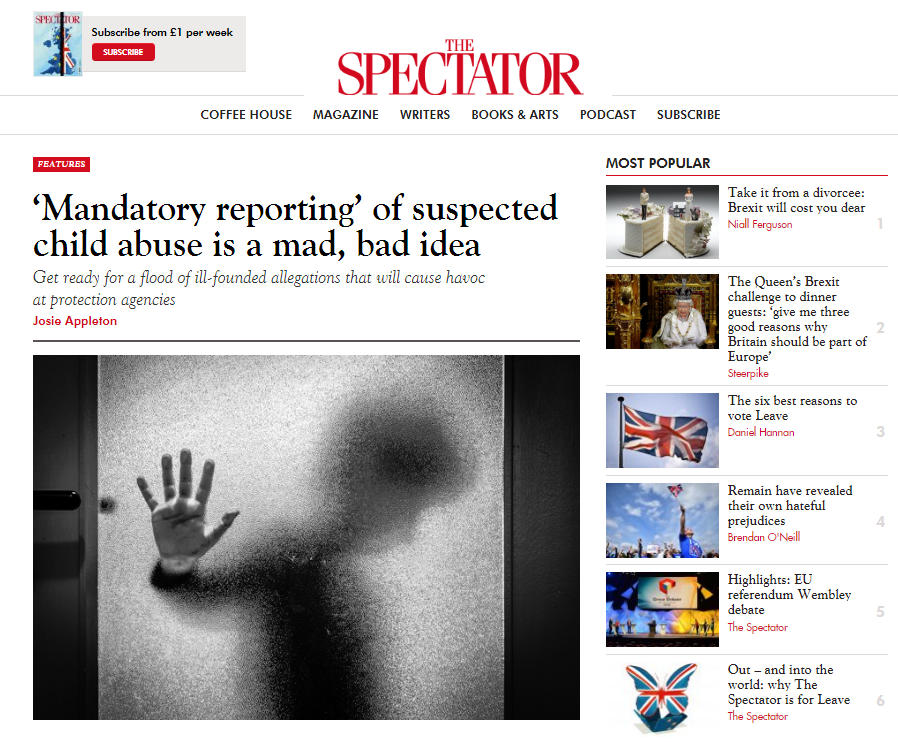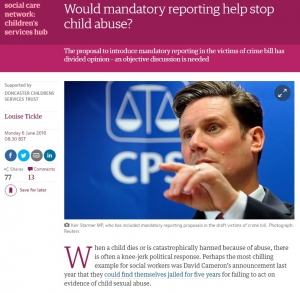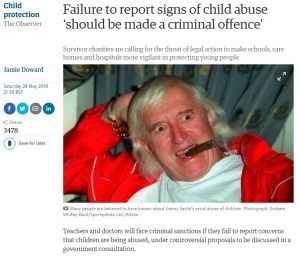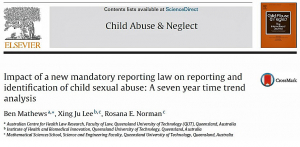Mandatory reporting laws for child sexual abuse are essential for kids and society: Professor Ben Mathews
Professor Ben Mathews is a researcher in the Australian Centre for Health Law Research at Queensland University of Technology in Brisbane, Australia. He has led some of the largest studies ever undertaken into mandatory reporting laws for child sexual abuse.
In the UK, 18% of girls and 5% of boys experience contact sexual abuse (one in eight children), and the figures are even higher for all kinds of sexual abuse. The mean age of onset is 9-10. Most children unlucky enough to suffer sexual abuse are unable to tell anyone, because they are terrified of the abuser’s power, have been threatened, feel ashamed, depend on the abuser, or are too young to understand it. The abuse often continues, the children endure horrific experiences and suffer long-lasting health, behavioural and social problems, and society suffers enormous socio-economic costs. Offenders get away with it and can continue offending. We see this repeatedly with prolific individuals and gangs: Rotherham, Rochdale, Savile, Oxford, Operation Yewtree. But it’s not just high profile casesthat matter: many offenders are family members and other acquaintances.
What should society do to better identify cases at an early stage, interrupt the abuse, help the child, and identify the offenders? We should do what the scientific evidence tells us will get the best result. We should put the child at the centre of our debate. And we should do what an advanced liberal democracy in the 21st century that cares about its children would do.
To identify more cases at an early stage, the UK Parliament is considering whether to introduce mandatory reporting laws for child sexual abuse in England and Wales. As a social scientist who has conducted multiple long-term studies of this topic, my conclusion is that a UK mandatory reporting law will be very successful in responding to child sexual abuse and identifying cases that otherwise would not come to light. Ireland must agree, since in November 2015 it passed reporting laws for child sexual abuse. In fact, dozens of nations have them, ranging from Canada, Australia and the USA, to Sweden and Saudi Arabia.
These laws are often misunderstood, which produces erroneous conclusions. The truth is that the best evidence indicates they are probably the best public policy innovation we have to help identify cases of child sexual abuse. Based on historical experience, hard data and international insights, here are the top 10 things policymakers, professionals, and the public need to know.
- The laws do not require everyone to report everything. Rather, they simply require designated people (typically teachers, doctors, nurses, police, and sometimes others dealing with kids in their work) to report specified sexual abuse. So, the laws do require teachers, for example, to report known or reasonably suspected serious sexual offences, based on a child’s disclosure or clear behavioural indicators. The laws don’t require teachers to report four year olds engaging in developmentally normal sexual behaviour, or teenagers taking consensual semi-naked selfies.
- For this reason, and because sexual abuse is difficult to detect and frequently undisclosed, even with the laws you will not get loads of “unnecessary reports”. Numerous jurisdictions have had these laws for decades and the sky hasn’t fallen in. In Australia, which has very broad reporting laws for multiple kinds of abuse, our recent nationwide study over 10 years found that mandated reports of child sexual abuse make up only about 6% of reports of all kinds of child maltreatment made to the government.
- The laws overcome gaze aversion, which is the tendency for people to avoid uncomfortable phenomena and turn the other way. They compel professionals to report when they know or suspect sexual abuse and set a social norm about what must be done instead of ignoring the child’s situation. Together with good education about child sexual abuse and the reporting duty, the laws increase professionals’ awareness of just how serious sexual abuse is, and its nature, frequency and indicators. The laws say what professionals must do. The education explains why. The laws also give reporters anonymity and legal immunity: important legal protections.
- The reason the laws help is that these professionals can play a massive role in identifying cases that otherwise would remain hidden. Data from other countries shows that 50-75% of sexual abuse cases confirmed by child protection agencies are found after mandated reports by these social sentinels. To sexually abused kids, these professionals are guardian angels.
- Here’s how two demographically similar jurisdictions with the same child population compared in 2010, one with mandatory reporting (Victoria: A), and one without (Ireland: B). A found 4.73 times as many sexually abused children (989) compared with B (209): 780 more children in one year. In A, the mandated reports alone (police, teachers, doctors, nurses) identified 536 confirmed cases; 2.5 times the entire amount in B. Twice the number of reports were made in A compared with B, with 53% of these made by mandated reporters.
- Still not convinced? Here’s what is likely to happen when you introduce a reporting law. We analysed data in an Australian state from three years pre-law and four years post-law. Due to improved reporting by mandated reporters after the law, twice as many children per year were officially identified as sexual abuse victims; and three times as many were investigated (which may be the best measure of success). Reporting trends stabilised after the third post-law year. Even at their highest new level, the rate of children in reports was one in 210.
- Numbers of mandated reports of sexual abuse remain very stable over time, especially compared with other maltreatment. Rapid sustained rises in reports have occasionally occurred, but these have been about neglect and domestic violence, not sexual abuse. Moreover, subsequent changes to law and policy have caused just as rapid a decline in reports.
- It’s impossible to give a comprehensive cost-benefit analysis. But, each case of child maltreatment has been estimated as costing US$210,000, child sexual abuse is arguably even more costly, and the costs of reporting and investigation are shown by leading researchers to be minimal in the child protection budget. Alongside the moral, legal and practical arguments, the economic argument based on returns from early intervention and increased offender detection is strong.
- A reporting law should not be limited only to offences within a “regulated activity” like boarding schools. Queensland did this, and had to expand the law after accepting it was theoretically, legally and practically indefensible. Are you really going to take seriously child sexual abuse you know or suspect occurs in a boarding school, but not every other case? No jurisdiction in the world does this and the UK shouldn’t either.
- That’s a lot of evidence. Now let’s consider the child’s experience, feelings, and needs. The abused child is terrified, wants it to stop, and needs health assistance. In the worst kind of case, she is raped daily by someone twice her size, and is completely in their power. She can’t escape it, process it, or stop it. Her teacher, doctor, or a police officer who knows or suspects something, might be the only person in her world who can help by reporting that suspicion.
This girl, and thousands of other children like her, needs someone to help bring her experience to the attention of a protective agency. That can best happen through a mandatory reporting law, properly supported by good reporter education and a well-supported system.
